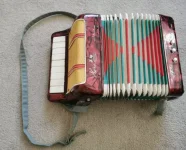Technical
Member
I have acquired a vintage Hero accordion like the one below for the grand old price of £7 and thought it may be fun, and a way to better understand how the accordion works, to have a go at repairing it the best I can. I know it won't make economic sense but it's just more of a little project and learning exercise especially as the risk couldn't really be lower, as long as I can get the bits to do it at a reasonable price. Possibly a stupid idea?
I think it will need the following as a minimum based on initial review:
1. bellows on the corners need some repairs, there are some holes. Any recommendations for this? I've seen metal corners but also seen an example of making/gluing leather corners.
2. Values replacing. Some are not flat and some are missing altogether.
3. Retuning. How do I know if reeds are ok enough to be kept and tuned or not? Looks like I need to remove some rust.
The treble reeds appear to have C, E, G written on them repeatedly for both sides (a pair per note) but I assume it should just be tuned diatonically (9 white notes) with each pair tuned slightly apart for the musette like sound but from memory I think it sounds different pulling from pushing, need to check again once I've reassembled it.
I've been looking online at websites, youtube and started making my way through https://accordionrevival.com/ but I wanted any insights from the community here too.
I've taken it apart so already have the pliers/screwdriver for that. I'm thinking I need something to repair the bellows holes with, new valves from somewhere, some appropriate glue and a file/scaper to tune the reeds with something to support the reeds.
Thanks.

I think it will need the following as a minimum based on initial review:
1. bellows on the corners need some repairs, there are some holes. Any recommendations for this? I've seen metal corners but also seen an example of making/gluing leather corners.
2. Values replacing. Some are not flat and some are missing altogether.
3. Retuning. How do I know if reeds are ok enough to be kept and tuned or not? Looks like I need to remove some rust.
The treble reeds appear to have C, E, G written on them repeatedly for both sides (a pair per note) but I assume it should just be tuned diatonically (9 white notes) with each pair tuned slightly apart for the musette like sound but from memory I think it sounds different pulling from pushing, need to check again once I've reassembled it.
I've been looking online at websites, youtube and started making my way through https://accordionrevival.com/ but I wanted any insights from the community here too.
I've taken it apart so already have the pliers/screwdriver for that. I'm thinking I need something to repair the bellows holes with, new valves from somewhere, some appropriate glue and a file/scaper to tune the reeds with something to support the reeds.
Thanks.





